Unit 11 How was your school trip-Section A 1a-1c 课件+嵌入音频(共51张PPT)
文档属性
| 名称 | Unit 11 How was your school trip-Section A 1a-1c 课件+嵌入音频(共51张PPT) | 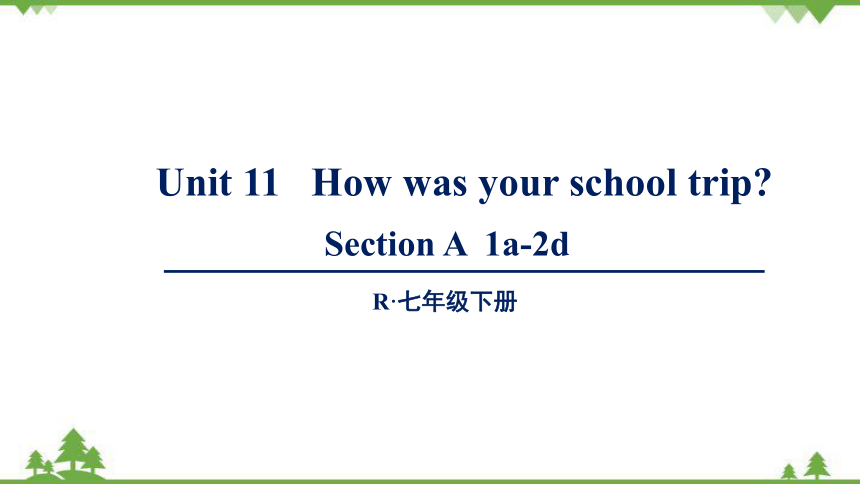 | |
| 格式 | ppt | ||
| 文件大小 | 79.1MB | ||
| 资源类型 | 教案 | ||
| 版本资源 | 人教新目标(Go for it)版 | ||
| 科目 | 英语 | ||
| 更新时间 | 2022-05-25 13:08:53 | ||
图片预览

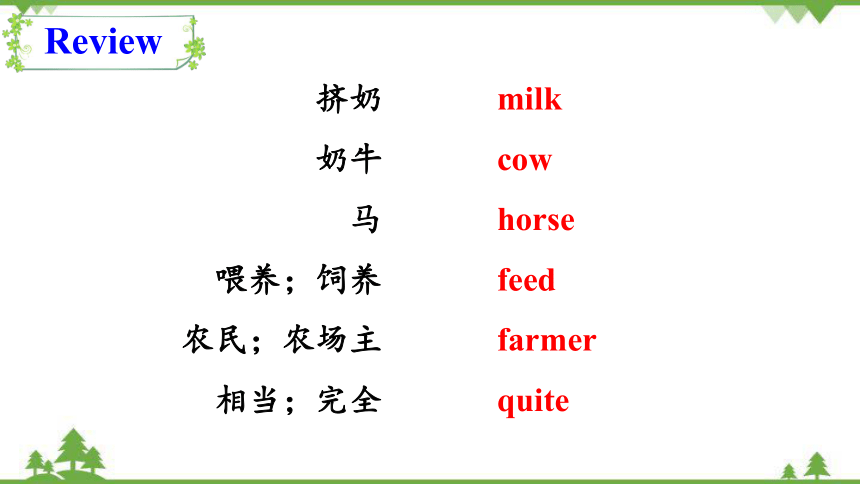
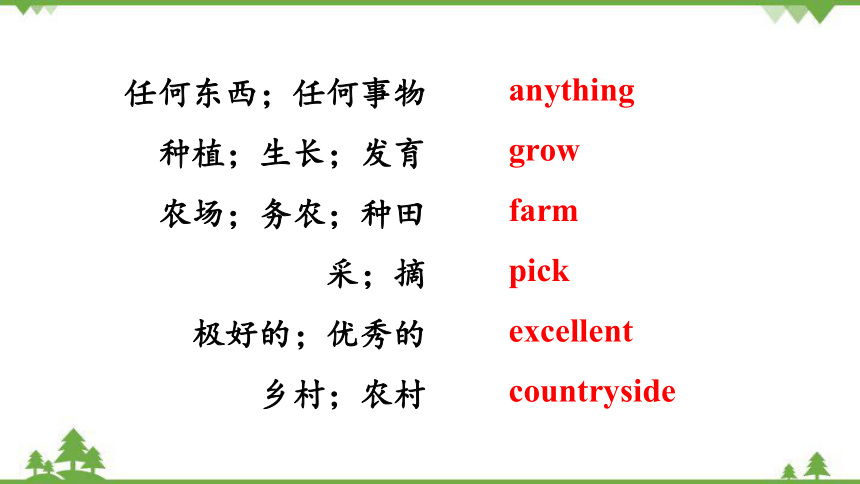
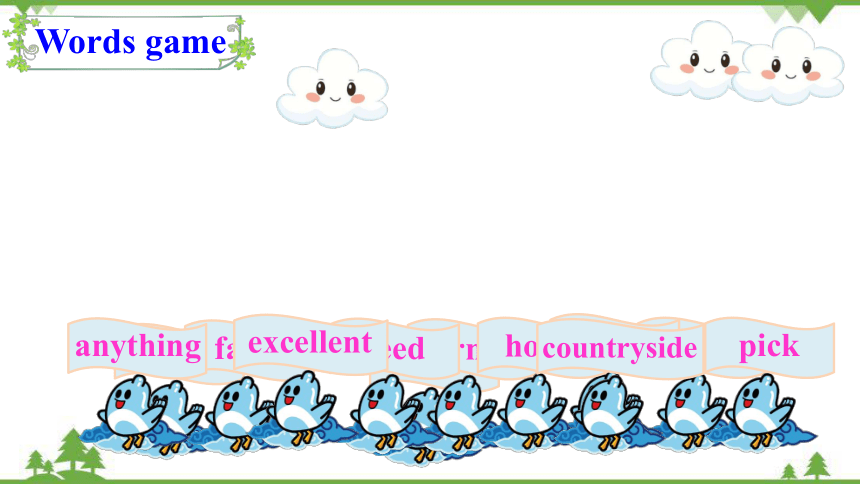
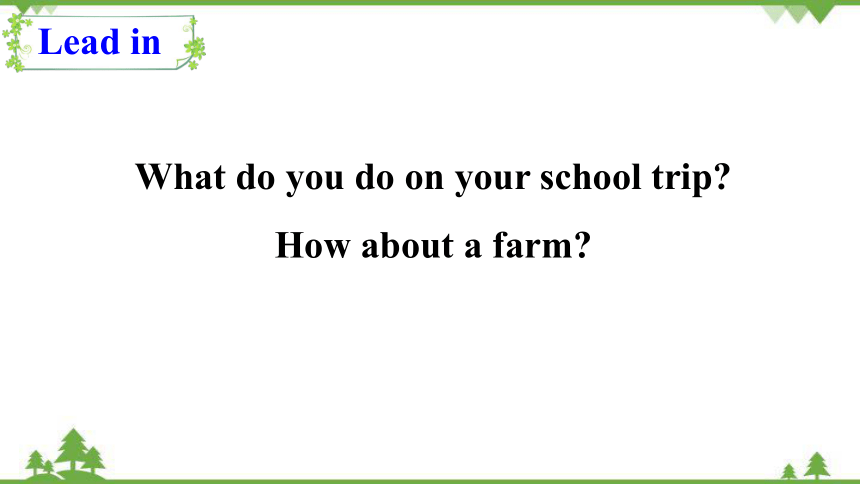
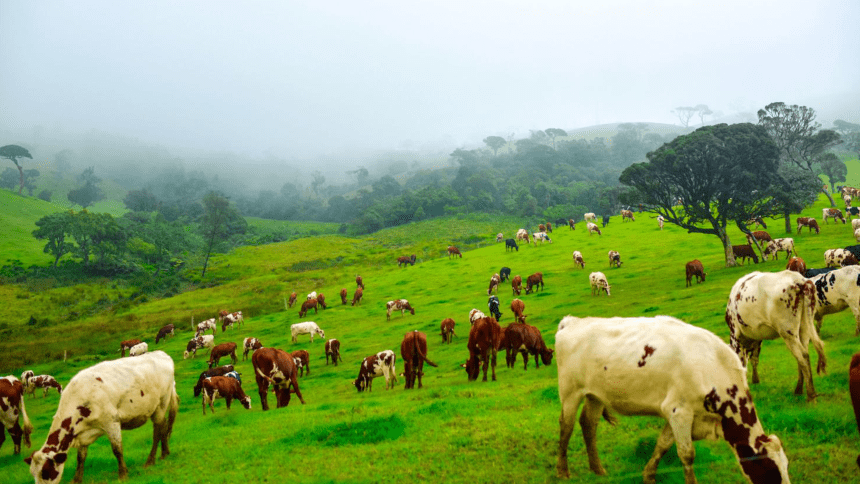
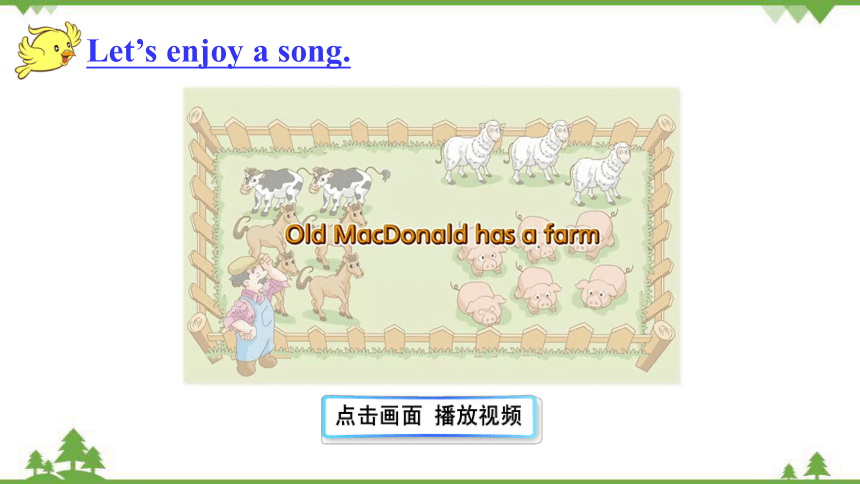
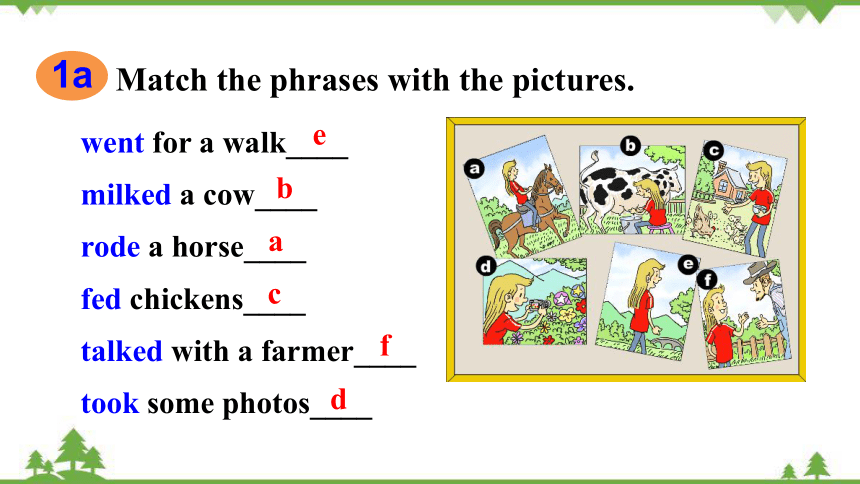
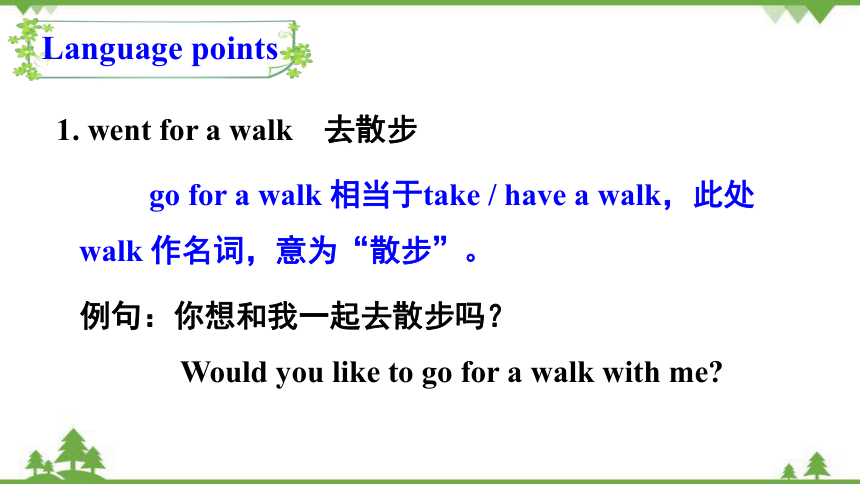
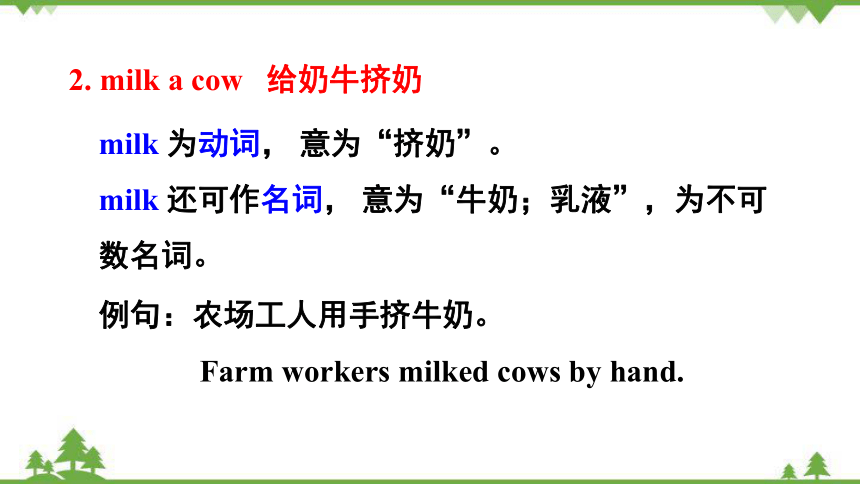
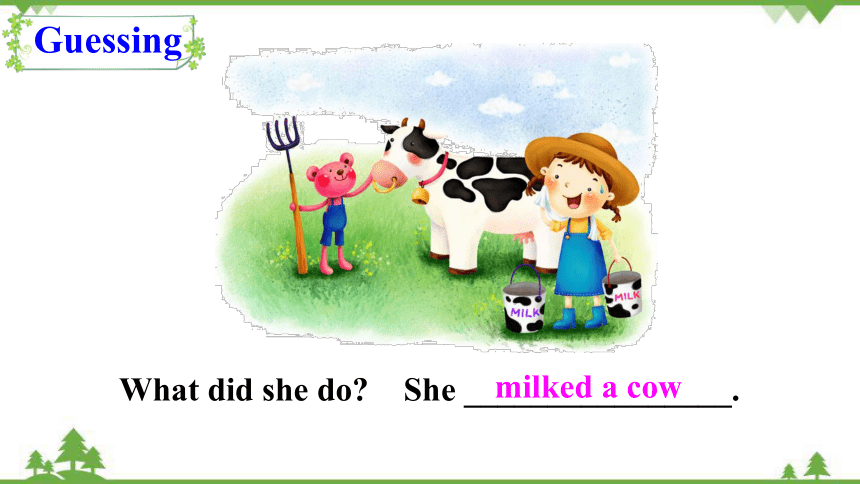
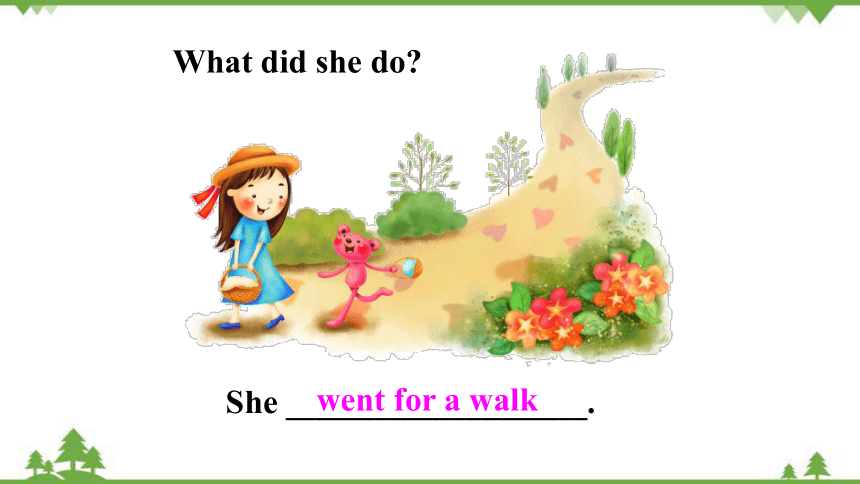
文档简介
(共51张PPT)
Unit 11 How was your school trip
R·七年级下册
Section A 1a-2d
Review
挤奶
奶牛
马
喂养;饲养
农民;农场主
相当;完全
milk
cow
horse
feed
farmer
quite
任何东西;任何事物
种植;生长;发育
农场;务农;种田
采;摘
极好的;优秀的
乡村;农村
anything
grow
farm
pick
excellent
countryside
grow
pick
cow
quite
farmer
farm
milk
anything
horse
feed
Words game
excellent
countryside
Lead in
What do you do on your school trip
How about a farm
Let’s enjoy a song.
1a
Match the phrases with the pictures.
went for a walk____
milked a cow____
rode a horse____
fed chickens____
talked with a farmer____
took some photos____
e
b
a
c
f
d
Language points
1. went for a walk 去散步
go for a walk 相当于take / have a walk,此处 walk 作名词,意为“散步”。
例句:你想和我一起去散步吗?
Would you like to go for a walk with me
2. milk a cow 给奶牛挤奶
milk 为动词, 意为“挤奶”。
milk 还可作名词, 意为“牛奶;乳液”,为不可数名词。
例句:农场工人用手挤牛奶。
Farm workers milked cows by hand.
Guessing
What did she do
She ________________.
milked a cow
What did she do
She __________________.
went for a walk
What did she do
She ________________.
took some photos
What did they do
They ______________.
rode a horse
1b
Listen and circle the three things Carol did on her school trip in 1a.
went for a walk milked a cow
rode a horse fed chickens
talked with a farmer took some photos
Did you see any cows
Yes, I did. I saw quite a lot.
Did you ride a horse
No, I didn’t. But I milked a cow.
Bob: Hi, Carol. How was your school trip yesterday
Carol: It was great!
Bob: Did you go to the zoo
Carol: No, I didn’t. I went to a farm. Look, here are
my photos.
Bob: Did you see any cows
Carol: Yes, I did. I saw quite a lot.
Listen again and then read them in groups.
相当多
Bob: Did you ride a horse
Carol: No, I didn’t. But I milked a cow.
Bob: Did you feed any chickens
Carol: Well, I saw some chickens but I didn’t feed them.
Bob: What else did you do
Carol: My friends and I went for a walk around the
farm and talked with a farmer.
Language points
1. — Did you see any cows
— Yes, I did. I saw quite a lot.
这是过去时态的一般疑问句,用于询问别人在过去某一时间是否做过某事。did 是do 的过去式,后接动词原形。
句型:Did+主语+动词原形+其他成分?
肯定回答:Yes, 主语+did.
否定回答: No, 主语+didn’t.
2. quite a lot 相当多
quite 作副词,意为“相当;非常”。
例句:我非常喜欢他。
I like him quite a lot.
a lot 后面不能直接跟名词,a lot of 相当于lots of,其后可接可数名词复数或不可数名词。
1c
Ask and answer questions about Carol’s school trip.
Did Carol take any photos
Yes, she did.
Play roles
Did Carol ...
Yes, she did/ No, she didn’t.
2a
Listen and check(√) the questions you hear.
_____ What did the farmer say
_____ Did you grow any apples
_____ What did you see
_____ Do they grow apples
_____ Did you learn anything
_____ Did you eat them
_____ Did you ask him any questions
_____ Were they good
√
√
√
√
2b
Listen again. Circle T for true or F for false.
1. The farmer showed Carol around the farm. T F
2. Carol learned a lot about farming. T F
3. The farmers grow strawberries from December to June.
T F
4. The farmers don’t grow apples. T F
5. Carol picked some strawberries and took them home.
T F
Bob: So, Carol, was the farmer nice
Carol: Yes, he was very friendly, and he showed us
around the farm.
Bob: Really What did you see
Carol: We saw a lot of interesting things and we learned
a lot from him about farming.
Bob: That’s great! Did you ask him any questions
Carol: Yes. I asked him if the farmers grew strawberries.
Tapescripts
showed
around
带领……参观……
①
learned
about
学习/了解……
②
farming
农事;耕作
Bob: Do they
Carol: Yes, they do. They grow them from December
to June.
Bob: And apples Do they grow apples
Carol: Yes, they do. They pick the apples around
September.
Bob: Did you pick any strawberries
Carol: Yes, we did. And we took some home, too!
Bob: Oh, wow! Were they good
Carol: They were delicious!
③
④
⑤
Language points
1. The farmer showed Carol around the farm.
show sb. around sth.= show sb. round sth.
带领某人参观……
例句:汤姆带她参观了学校。
Tom showed her around the school.
拓展:show作及物动词,意为“给……看;出示;
显示”,常构成show sb. sth. 或show sth. to sb.
结构。
例句:请把那张照片拿给我看看。
Please show me that photo.
= Please show that photo to me.
2. Carol learned a lot about farming.
learn about… 学习/ 知道/ 了解……
learn about 了解/知道/获悉,相当于know about。
例句:你是怎么知道会议的情况的?
How did you learn / know about the meeting
farming 为名词,意为“农事;耕作”。其动词为farm,意为“耕种;干农活”。
例句:他在一个大农场务农。
He is farming in a big farm.
2c
Ask and answer questions about Carol’s visit to the farm.
What did Carol do
She picked some strawberries.
Activity
Talk about your school trip.
What did you do
I …
2d
Read the conversation and answer.
1. Where did Eric go last weekend
2. Why did he go there
3. What did he do
4. How was the weather there
5. What did he do at night
6. How did Eric feel about the trip
He went to the countryside.
He visited his grandparents.
He went fishing and fed the chickens.
1. Where did Eric go last weekend
2. Why did he go there
3. What did he do
4. How was the weather there
5. What did he do at night
6. How did Eric feel about the trip
It was great and the air was so clean.
He watched the stars.
It was excellent.
Peter: Hi, Eric. How was your trip last week
Eric: It was excellent. I visited my grandparents in
the countryside.
Peter: Oh, nice. What did you do
Eric: I went fishing every day. And I fed the chickens
with my grandpa. It was so much fun.
Role-play the conversation.
How was
询问某事情况的常用句型
trip
郊游,旅行
went fishing
去钓鱼
Peter: Sounds good. How was the weather there
Eric: It was great, and the air was so clean. I watched
the stars at night. They were so beautiful.
Peter: Lucky you.
clean
干净的;清洁的
Fill in the blanks.
Peter: Hi, Eric. How______ your trip last week
Eric: It was excellent. I _______ my grandparents in
the countryside.
Peter: Oh, nice. What ______ you do
Eric: I _____ fishing every day. And I _______ the
chickens with my grandpa. It _____ so much fun.
was
visited
did
went
fed
was
Peter: Sounds good. How ______ the weather there
Eric: It was great, and the air _____so clean. I _______
the stars at night. They _______ so beautiful.
Peter: Lucky you.
was
was
watched
were
Language points
1. How was your trip last week
(1) 本句为询问某事情况的常用句型。
句型结构:How was/were…
常用答语:It was great. 好极了 It was OK. 还可以
It wasn’t good. 不好
It was not bad. 还不错
(2) trip为可数名词,意为“郊游,旅行”,通常
指近距离的旅行,并且往往要回到出发点。
例句:旅途愉快!
Have a good trip!
2. —What did you do 你做了什么?
—I went fishing every day. 我每天都去钓鱼。
“What did you do ”是由what引导的一般过去时的特殊疑问句,询问对方在过去的时间做了什么事请。what是特殊疑问词,意思是“什么”。
3. went fishing
went fishing 是go fishing的过去式,意为“去钓鱼”。
例句:他昨天没有去钓鱼。
He didn’t go fishing yesterday.
拓展:went fishing 类似词组
go hiking 去远足
go shopping 去购物
go swimming 去游泳
go boating 去划船
4. It was great, and the air was so clean.
(1) 此处clean作形容词,意为“干净的;清洁的”。
clean还可作动词,意为“打扫;把……弄干净”。
反义词:dirty 脏的
例句:我们住在干净的房间里。
We live in a clean room.
(2) so 为副词,意为“非常;那么;很”,so 后接形
容词或副词,后接形容词时,常用于形容情感或
品质的程度,或数量之大等。
例句:你真漂亮。
You are so beautiful.
Exercise
1. Did you talk with _____ farmers
A. some B. a C. any
2. —What did Sam do on the farm
—He _____ chickens.
A. feeds B. fed C. grows
单项选择。
3. His school trip was _____. He had a good time.
A. great B. boring C. terrible
4. — _____ you _____ to the zoo last Sunday
—No, I didn’t.
A. Do; go B. Are; going C. Did; go
Let me ________ ________ ________(带领你参观)the city.
Carol ________ ________ (去钓鱼)every Sunday last summer.
My trip was great yesterday. (对画线部分提问)
________ ________ your trip yesterday
show you around
went fishing
How was
按要求完成句子。
4. They went to the park last Sunday.(对画线部分提问)
_______ _______ they _______ last Sunday
5. 今天天气如此好,我想去外面打篮球。(汉译英)
The weather _______ _______ great that I want to
play basketball outside today.
What did do
is so
Unit 11 How was your school trip
R·七年级下册
Section A 1a-2d
Review
挤奶
奶牛
马
喂养;饲养
农民;农场主
相当;完全
milk
cow
horse
feed
farmer
quite
任何东西;任何事物
种植;生长;发育
农场;务农;种田
采;摘
极好的;优秀的
乡村;农村
anything
grow
farm
pick
excellent
countryside
grow
pick
cow
quite
farmer
farm
milk
anything
horse
feed
Words game
excellent
countryside
Lead in
What do you do on your school trip
How about a farm
Let’s enjoy a song.
1a
Match the phrases with the pictures.
went for a walk____
milked a cow____
rode a horse____
fed chickens____
talked with a farmer____
took some photos____
e
b
a
c
f
d
Language points
1. went for a walk 去散步
go for a walk 相当于take / have a walk,此处 walk 作名词,意为“散步”。
例句:你想和我一起去散步吗?
Would you like to go for a walk with me
2. milk a cow 给奶牛挤奶
milk 为动词, 意为“挤奶”。
milk 还可作名词, 意为“牛奶;乳液”,为不可数名词。
例句:农场工人用手挤牛奶。
Farm workers milked cows by hand.
Guessing
What did she do
She ________________.
milked a cow
What did she do
She __________________.
went for a walk
What did she do
She ________________.
took some photos
What did they do
They ______________.
rode a horse
1b
Listen and circle the three things Carol did on her school trip in 1a.
went for a walk milked a cow
rode a horse fed chickens
talked with a farmer took some photos
Did you see any cows
Yes, I did. I saw quite a lot.
Did you ride a horse
No, I didn’t. But I milked a cow.
Bob: Hi, Carol. How was your school trip yesterday
Carol: It was great!
Bob: Did you go to the zoo
Carol: No, I didn’t. I went to a farm. Look, here are
my photos.
Bob: Did you see any cows
Carol: Yes, I did. I saw quite a lot.
Listen again and then read them in groups.
相当多
Bob: Did you ride a horse
Carol: No, I didn’t. But I milked a cow.
Bob: Did you feed any chickens
Carol: Well, I saw some chickens but I didn’t feed them.
Bob: What else did you do
Carol: My friends and I went for a walk around the
farm and talked with a farmer.
Language points
1. — Did you see any cows
— Yes, I did. I saw quite a lot.
这是过去时态的一般疑问句,用于询问别人在过去某一时间是否做过某事。did 是do 的过去式,后接动词原形。
句型:Did+主语+动词原形+其他成分?
肯定回答:Yes, 主语+did.
否定回答: No, 主语+didn’t.
2. quite a lot 相当多
quite 作副词,意为“相当;非常”。
例句:我非常喜欢他。
I like him quite a lot.
a lot 后面不能直接跟名词,a lot of 相当于lots of,其后可接可数名词复数或不可数名词。
1c
Ask and answer questions about Carol’s school trip.
Did Carol take any photos
Yes, she did.
Play roles
Did Carol ...
Yes, she did/ No, she didn’t.
2a
Listen and check(√) the questions you hear.
_____ What did the farmer say
_____ Did you grow any apples
_____ What did you see
_____ Do they grow apples
_____ Did you learn anything
_____ Did you eat them
_____ Did you ask him any questions
_____ Were they good
√
√
√
√
2b
Listen again. Circle T for true or F for false.
1. The farmer showed Carol around the farm. T F
2. Carol learned a lot about farming. T F
3. The farmers grow strawberries from December to June.
T F
4. The farmers don’t grow apples. T F
5. Carol picked some strawberries and took them home.
T F
Bob: So, Carol, was the farmer nice
Carol: Yes, he was very friendly, and he showed us
around the farm.
Bob: Really What did you see
Carol: We saw a lot of interesting things and we learned
a lot from him about farming.
Bob: That’s great! Did you ask him any questions
Carol: Yes. I asked him if the farmers grew strawberries.
Tapescripts
showed
around
带领……参观……
①
learned
about
学习/了解……
②
farming
农事;耕作
Bob: Do they
Carol: Yes, they do. They grow them from December
to June.
Bob: And apples Do they grow apples
Carol: Yes, they do. They pick the apples around
September.
Bob: Did you pick any strawberries
Carol: Yes, we did. And we took some home, too!
Bob: Oh, wow! Were they good
Carol: They were delicious!
③
④
⑤
Language points
1. The farmer showed Carol around the farm.
show sb. around sth.= show sb. round sth.
带领某人参观……
例句:汤姆带她参观了学校。
Tom showed her around the school.
拓展:show作及物动词,意为“给……看;出示;
显示”,常构成show sb. sth. 或show sth. to sb.
结构。
例句:请把那张照片拿给我看看。
Please show me that photo.
= Please show that photo to me.
2. Carol learned a lot about farming.
learn about… 学习/ 知道/ 了解……
learn about 了解/知道/获悉,相当于know about。
例句:你是怎么知道会议的情况的?
How did you learn / know about the meeting
farming 为名词,意为“农事;耕作”。其动词为farm,意为“耕种;干农活”。
例句:他在一个大农场务农。
He is farming in a big farm.
2c
Ask and answer questions about Carol’s visit to the farm.
What did Carol do
She picked some strawberries.
Activity
Talk about your school trip.
What did you do
I …
2d
Read the conversation and answer.
1. Where did Eric go last weekend
2. Why did he go there
3. What did he do
4. How was the weather there
5. What did he do at night
6. How did Eric feel about the trip
He went to the countryside.
He visited his grandparents.
He went fishing and fed the chickens.
1. Where did Eric go last weekend
2. Why did he go there
3. What did he do
4. How was the weather there
5. What did he do at night
6. How did Eric feel about the trip
It was great and the air was so clean.
He watched the stars.
It was excellent.
Peter: Hi, Eric. How was your trip last week
Eric: It was excellent. I visited my grandparents in
the countryside.
Peter: Oh, nice. What did you do
Eric: I went fishing every day. And I fed the chickens
with my grandpa. It was so much fun.
Role-play the conversation.
How was
询问某事情况的常用句型
trip
郊游,旅行
went fishing
去钓鱼
Peter: Sounds good. How was the weather there
Eric: It was great, and the air was so clean. I watched
the stars at night. They were so beautiful.
Peter: Lucky you.
clean
干净的;清洁的
Fill in the blanks.
Peter: Hi, Eric. How______ your trip last week
Eric: It was excellent. I _______ my grandparents in
the countryside.
Peter: Oh, nice. What ______ you do
Eric: I _____ fishing every day. And I _______ the
chickens with my grandpa. It _____ so much fun.
was
visited
did
went
fed
was
Peter: Sounds good. How ______ the weather there
Eric: It was great, and the air _____so clean. I _______
the stars at night. They _______ so beautiful.
Peter: Lucky you.
was
was
watched
were
Language points
1. How was your trip last week
(1) 本句为询问某事情况的常用句型。
句型结构:How was/were…
常用答语:It was great. 好极了 It was OK. 还可以
It wasn’t good. 不好
It was not bad. 还不错
(2) trip为可数名词,意为“郊游,旅行”,通常
指近距离的旅行,并且往往要回到出发点。
例句:旅途愉快!
Have a good trip!
2. —What did you do 你做了什么?
—I went fishing every day. 我每天都去钓鱼。
“What did you do ”是由what引导的一般过去时的特殊疑问句,询问对方在过去的时间做了什么事请。what是特殊疑问词,意思是“什么”。
3. went fishing
went fishing 是go fishing的过去式,意为“去钓鱼”。
例句:他昨天没有去钓鱼。
He didn’t go fishing yesterday.
拓展:went fishing 类似词组
go hiking 去远足
go shopping 去购物
go swimming 去游泳
go boating 去划船
4. It was great, and the air was so clean.
(1) 此处clean作形容词,意为“干净的;清洁的”。
clean还可作动词,意为“打扫;把……弄干净”。
反义词:dirty 脏的
例句:我们住在干净的房间里。
We live in a clean room.
(2) so 为副词,意为“非常;那么;很”,so 后接形
容词或副词,后接形容词时,常用于形容情感或
品质的程度,或数量之大等。
例句:你真漂亮。
You are so beautiful.
Exercise
1. Did you talk with _____ farmers
A. some B. a C. any
2. —What did Sam do on the farm
—He _____ chickens.
A. feeds B. fed C. grows
单项选择。
3. His school trip was _____. He had a good time.
A. great B. boring C. terrible
4. — _____ you _____ to the zoo last Sunday
—No, I didn’t.
A. Do; go B. Are; going C. Did; go
Let me ________ ________ ________(带领你参观)the city.
Carol ________ ________ (去钓鱼)every Sunday last summer.
My trip was great yesterday. (对画线部分提问)
________ ________ your trip yesterday
show you around
went fishing
How was
按要求完成句子。
4. They went to the park last Sunday.(对画线部分提问)
_______ _______ they _______ last Sunday
5. 今天天气如此好,我想去外面打篮球。(汉译英)
The weather _______ _______ great that I want to
play basketball outside today.
What did do
is so
同课章节目录
- Unit 1 Can you play the guitar?
- Section A
- Section B
- Unit 2 What time do you go to school?
- Section A
- Section B
- Unit 3 How do you get to school?
- Section A
- Section B
- Unit 4 Don't eat in class.
- Section A
- Section B
- Unit 5 Why do you like pandas?
- Section A
- Section B
- Unit 6 I'm watching TV.
- Section A
- Section B
- Review of Units 1-6
- Unit 7 It's raining!
- Section A
- Section B
- Unit 8 Is there a post office near here?
- Section A
- Section B
- Unit 9 What does he look like?
- Section A
- Section B
- Unit 10 I'd like some noodles.
- Section A
- Section B
- Unit 11 How was your school trip?
- Section A
- Section B
- Unit 12 What did you do last weekend?
- Section A
- Section B
